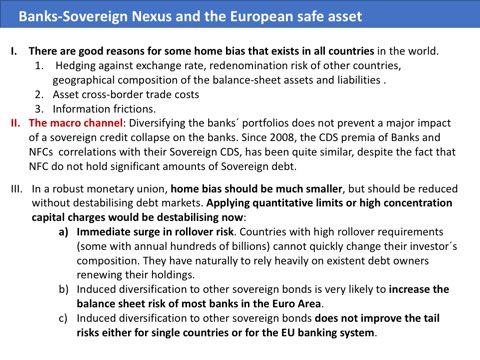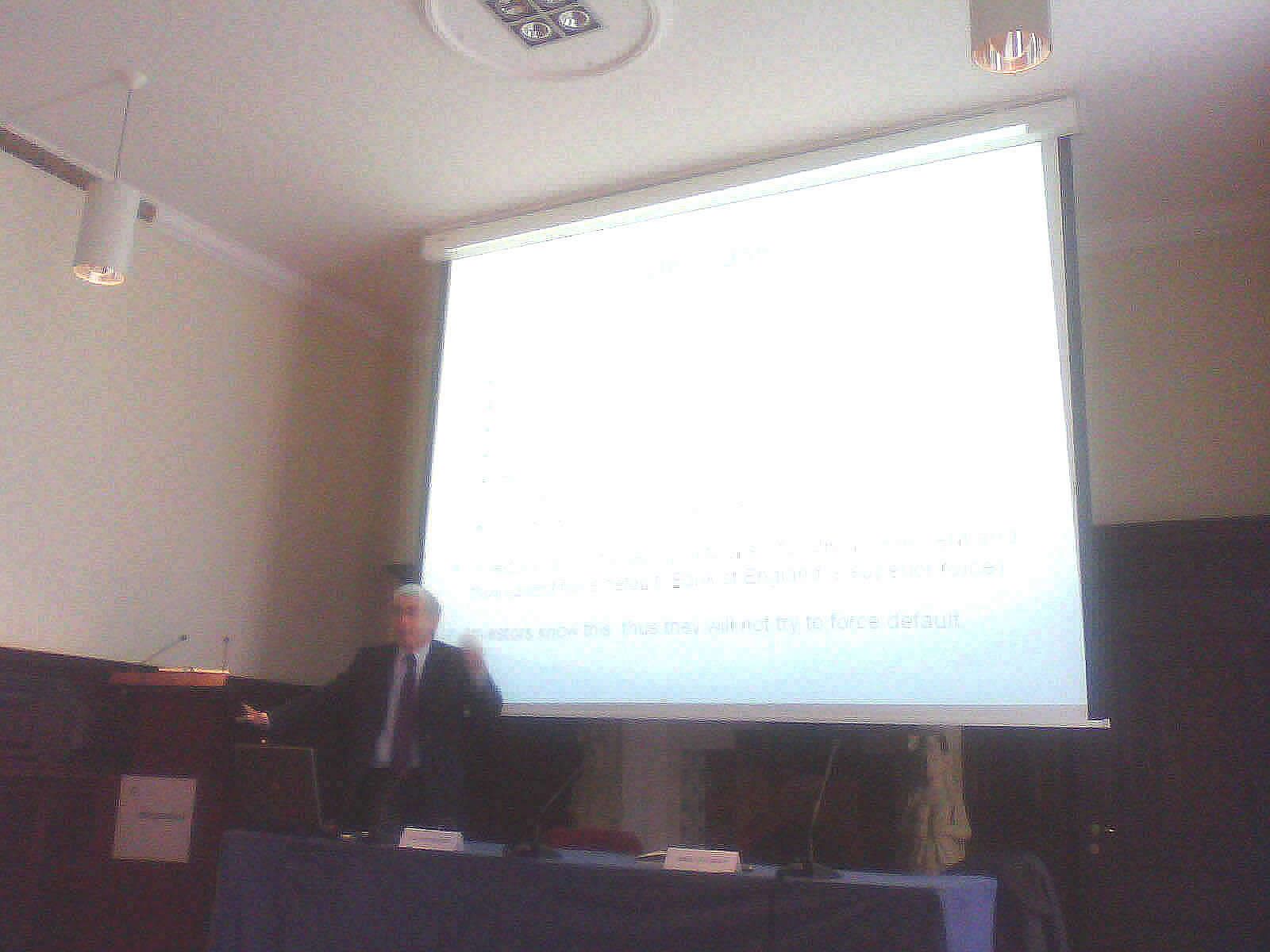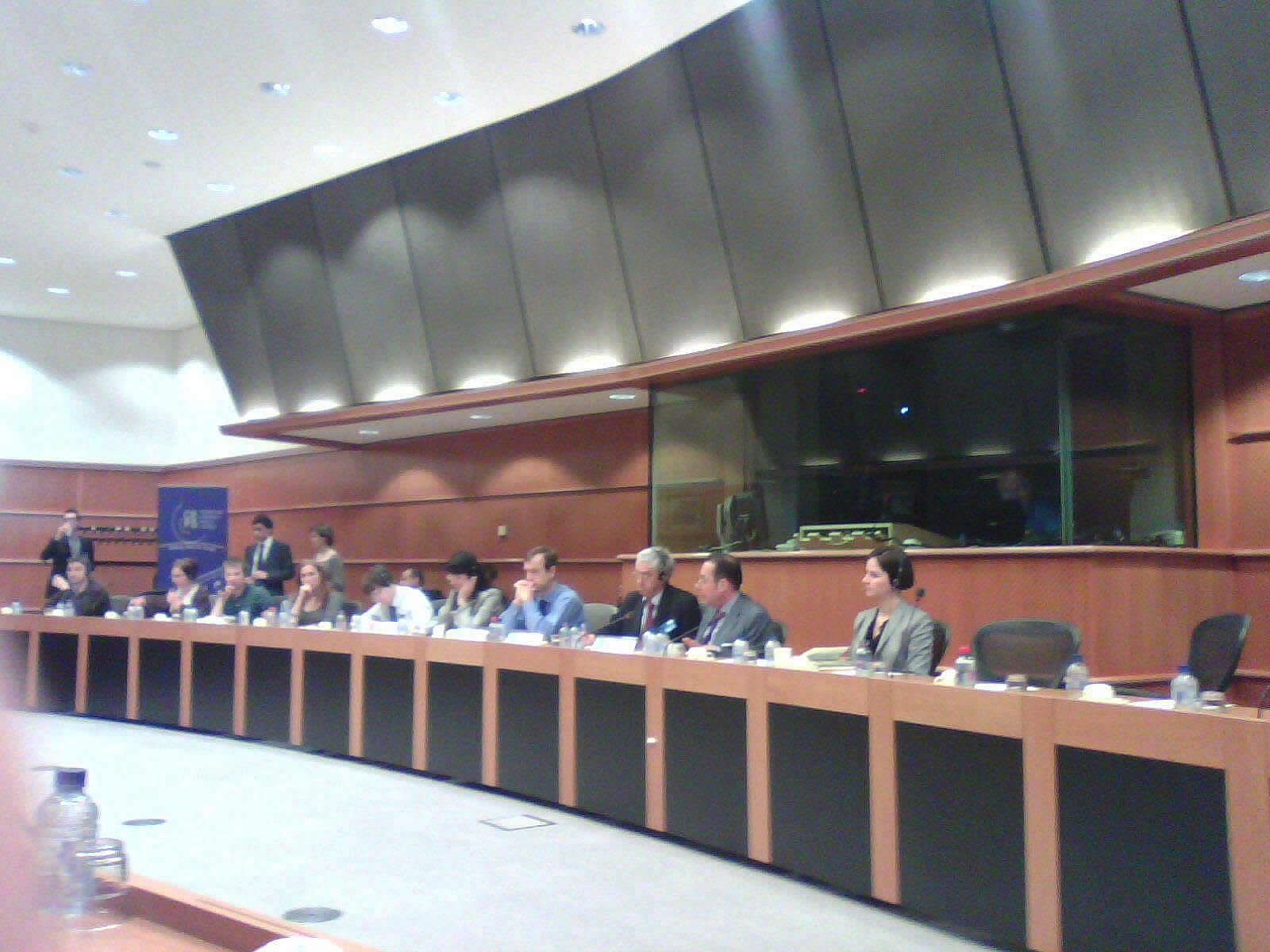| @VMRConstancio
I participated today in a Conference at the Belgium Central Bank in the panel with the following topic: “Euro Area governance: is it fit for the next crisis”. Here are some of the slides I used: |

GOVERNANCE of a FRAGILE EUROZONE |
| __________________________________________________________________________________________________________________________________________________________________________ |
 |
A monetary union can only function if there is a collective mechanism of mutual support and control. Such a collective mechanism exists in a political union. In the absence of a political union, the member countries of the Eurozone are condemned to fill in the necessary pieces of such a collective mechanism. In
order
to
design
the
appropriate
governance
institutions
for
the
Eurozone
it
is
important
to
make
the
right
diagnosis
of
the
nature
of
the
debt
crisis
in
the
Eurozone.
Failure
to
do
so,
can
lead
to
designing
a
governance
structure
that
is
inappropriate
for
dealing
with
the
problems
of
the
Eurozone.
In order for the Eurozone to survive, it will have to be embedded in a much stronger political union than is the case today.
In
the
paper
it is argued
that
the
governance
structure
that
has
emerged
after
a
series
of
decisions
of
successive
European
Council
meetings,
although
an
important
step
forwards,
fails
to
address
some
fundamental
problems
in
a
monetary
union. |
The paper analyzes the implications of this fragility for the governance of the eurozone. It concludes that the new governance-structure - the European Stability Mechanism (ESM), which is intended to be successor starting 2013 of the European Financial Stability Mechanism (EFSF), created in May 2010 - does not
sufficiently
recognize
this
fragility.
Some
of
the
features
of
the
new
financial
assistance
are
likely
to
increase
this
fragility.
In
addition,
it
is
also likely
to
rip
member-countries
of
their
ability
to
use
the
automatic
stabilizers
during
a
recession.
This
is
surely
a
step
backward
in
the
long
history
of
social
progress
in
Europe.
I
suggest
a
different
approach
to
deal
with
these
problems. |
 |
When entering a monetary union, countries loose their capacity to issue debt in a currency over which they have full control. As a result, a loss of confidence of investors can in a self-fulfilling way drive the country into default. This dynamics has been at the core of the problems experienced by the countries in the periphery of the Eurozone. Because of the liquidity flows triggered by changing market sentiments, member-countries of a monetary union become vulnerable to these market sentiments. These can lead to “sudden stops” in the funding of the government debt, setting in motion a devilish interaction between liquidity and solvency crises.
The reason is that the liquidity crisis raises the interest rate. The higher interest rate in turn makes it impossible for the countries affected by distrust to service their debts. A solvency crisis ensues.
This problem is not unique for members of a monetary union. It has been found to be very important in emerging economies that cannot issue debt in their own currencies. In this sense member-countries of a monetary union have been downgraded to the status of emerging economies. There are important further implications of the increased vulnerability of member-countries of a monetary union. One of these is that member-countries of a monetary union loose much of their capacity to apply counter-cyclical budgetary policies. When during a recession the budget deficits increase, this risks creating a loss of confidence of investors in the capacity of the sovereign to service the debt, leading to a liquidity and solvency crisis. The sharp increases in the interest rate aggravate the recession, and lead to even higher budget deficits. As a result, countries in a monetary union can be forced into a bad equilibrium, characterized by deflation, high interest rates, high budget deficits and a banking crisis. |
These systemic features of a monetary union have not sufficiently been taken into account in the new design of the economic governance of the Eurozone. Too much of this new design has been influenced by the notion (based on moral hazard thinking) that when a country experiences budget deficits and increasing debts, it should be punished by high interest rates and tough austerity programs. This approach is usually not helpful in restoring budgetary balance.
A monetary union creates collective problems. When one government faces a debt crisis this is likely to lead to major financial repercussions in other member countries. This is so because a monetary union leads to intense financial integration. The externalities inherent in a monetary union lead to the need for collective action in the form of a European Monetary Fund. This idea has been implemented when the EFSF was instituted and which will obtain a permanent character in 2013 when it is transformed into the ESM. The creation of these institutions for mutual financial assistance has been an important step forward. However, too much importance has been given to punishment and not enough to assistance in the new design of financial assistance in the Eurozone (EFSF and ESM). Surely, when providing mutual financial assistance, it is important to create the right incentives for governments so as to avoid moral hazard. Discipline by the threat of punishment is part of such an incentive scheme. But too much of this is counterproductive and makes it more difficult for countries receiving financial assistance to generate growth, without which there is no recovery. This excessive emphasis on punishment is also responsible for a refusal to introduce new institutions that will protect member countries from the vagaries of financial markets that can trap countries into a debt crisis and a bad equilibrium. One such an institution is the collective issue of government bonds Such a common bond issue makes it possible to solve the coordination failure that arises when markets in a self-fulfilling way guide countries to a bad equilibrium. It is equivalent to setting up a collective defense system against the vagaries of euphoria and fears that regularly grip financial markets, and have the effect of leading to centrifugal forces in a monetary union. |
The dialogue was preceeded by initiating that contributions has also to come from member-states, there is talk of a difficult position (till 2013) and that economic growth is needed. At the same time the need for mechanisms and financial consolidation and discipline was raised. The paper starts with a paradox by comparing GDP ratios of the UK and Spain. It is of different nature, in spite of many fundamental problems. The UK has even a worse deficit.
Member-states loosed some of their controls (their national central bank, exchange rates and government bonds). The system for the benefit of providing liquidity became different. Now there is distrust and the power of the markets is increased. The EMU is fragile by this influence and self fulfilling prophecy by the markets. Solvency and trust matters. Solve funding problems to help the markets stabilised. Collective political action is needed, not by fighting the markets (after all, ´they are always right´), but by obviating causes and by a strategy of small steps. What we have learned is don´t start a monetary union, without a budgetary union, unless there is talk of instruments, that substitutes the instruments that were send in. Now we need to make up leeway and thought of an EMF (European Monetary Fund, such as the IMF, an independent body and funded by automatic contributions by member-states, linked to deficits) and issuing Eurobonds. Moreover, more coordination of economic policies will be required. Letting things drift will cause haircuts. It it is not so a good idea to punish, but better to create conditions, which will solve by putting the finger on the fragility. Though, iIt still stays difficult to reach consenus on Greece. |
 |
A real danger of Eurozone-collapse is present. 'Boom-bust' cycles reoccurr again and capital is flowing there and back. Excesses have to be avoided. How to do this in detail is not easy to fulfil. Political will and tools should be of great influence to solve the crisis. Don't let the markets decide. It will go wrong.
Proposal for Greece: a discount of Greek bonds and than an independent institution for and negotations with Greece to make the process bearable and to strive after a better public budget. In the world there is interest to step in in the Greek tragedy. For instance by Korea and China. The EIB (European Investment Bank) can act as catalyst and create stimulus. The instruments are present, we just have to use them. |